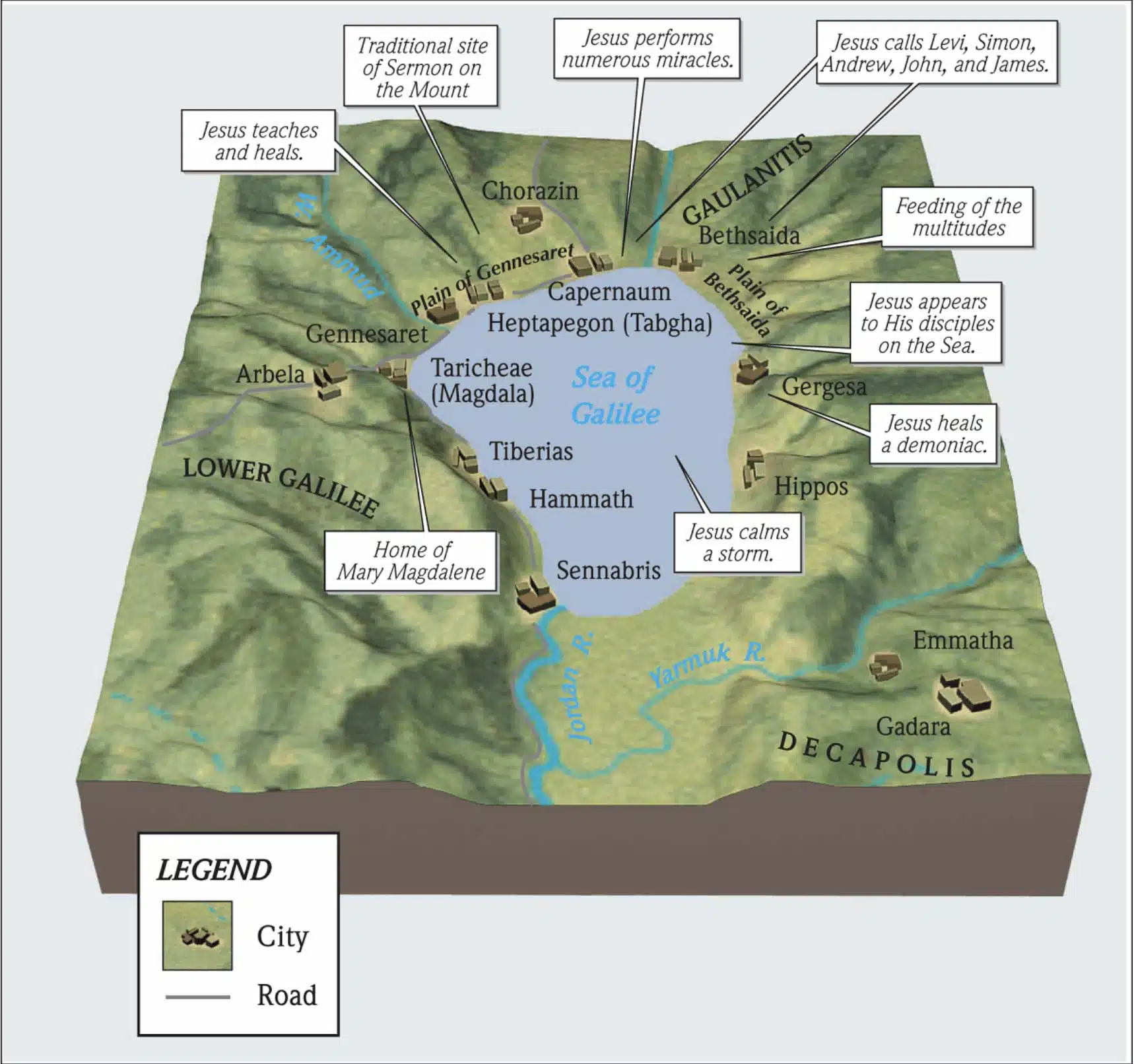Peter states the qualifications for Judas’ replacement: he must be someone who followed Jesus from His baptism until His return to Heaven. Two men are nominated. They pray for God’s guidance, draw straws, and choose a man named Matthias.
Peter continues to explain the need to replace the twelfth apostle, Judas (who betrayed Jesus and then committed suicide). Peter argues that it is necessary that of the men who have accompanied us all the time that the Lord Jesus went in and out among us— beginning with the baptism of John until the day that He was taken up from us—one of these must become a witness with us of His resurrection. This makes it clear that while Jesus had an inner twelve, there was actually a considerable crowd of disciples who followed Him all during His ministry. It was from among this faithful group that they were to choose someone to take the place of Judas.
There are 120 disciples gathered in the upper room in Jerusalem, waiting for the Holy Spirit to arrive. From among them, Peter lays out the qualifications for Judas’s replacement: the twelfth apostle should be of the men who have accompanied us all the time that the Lord Jesus went in and out among us. First and foremost, he should be a man who was a faithful follower of Jesus throughout His three-year ministry.
Secondly, he must be a disciple who was there for the entirety of Jesus’s ministry, from the beginning—Jesus’s baptism by John—until the end—the day that Jesus was taken up from us. The day when He was taken up into Heaven could have been that same day, or a previous day, as this gathering in the upper room. The feast of Pentecost is 50 days after the Passover feast, and Jesus spent 40 days with His disciples before ascending. So there was about a week between His ascension and Pentecost, when the Holy Spirit arrives (Acts 2:1).
Therefore, of the 120 disciples present, they needed a man who had been with them since the beginning, who had always been with them. Judas’ replacement must become a witness with the other eleven apostles of Jesus’ resurrection, fulfilling Jesus’ Great Commission which He gave the disciples, that they would be His witnesses to the whole world of His resurrection (Acts 1:8). As witnesses, they would tell the world what they had seen Christ accomplish—His death and resurrection which would raise spiritually dead people into new life and relationship with God, by faith alone in Jesus’s sacrifice.
Two candidates are put forward, two men who meet these qualifications. One is Joseph called Barsabbas (who was also called Justus), and the other is Matthias. The group nominated two who were qualified.
The disciples prayed for discernment from God, saying, You, Lord, who know the hearts of all men, show which one of these two You have chosen to occupy this ministry and apostleship from which Judas turned aside to go to his own place.
And they drew lots for them, something like drawing straws or names to see which man God would choose. It should be clear that the disciples did not trust the lots themselves to answer their question, like a fortune teller’s crystal ball. The casting of lots was a technique that had been used in Israel for generations to discern God’s will (Leviticus 16:8; Joshua 18:6; 1 Samuel 14:42). Their prayer to God shows that their focus was on His will and His power to choose; that He knows the hearts of all men. They requested that God, not chance, would show which one of these two He had chosen to replace Judas who turned aside to go to his own place (who betrayed Jesus and despaired to the point of suicide).
So they drew lots and the lot fell to Matthias; and he was added to the eleven apostles. Matthias was chosen to occupy the ministry and apostleship which originally belonged to Judas before he betrayed Jesus.
Biblical Text
21 Therefore it is necessary that of the men who have accompanied us all the time that the Lord Jesus went in and out among us— 22 beginning with the baptism of John until the day that He was taken up from us—one of these must become a witness with us of His resurrection.” 23 So they put forward two men, Joseph called Barsabbas (who was also called Justus), and Matthias. 24 And they prayed and said, “You, Lord, who know the hearts of all men, show which one of these two You have chosen 25 to occupy this ministry and apostleship from which Judas turned aside to go to his own place.” 26 And they drew lots for them, and the lot fell to Matthias; and he was added to the eleven apostles.
Check out our other commentaries:
-
Zephaniah 2:13-15 meaning
Zephaniah pronounces judgment against Assyria for her pride and arrogance. God will make Nineveh a ruin, and the land of Assyria will be emptied of...... -
Genesis 19:27-29 meaning
Abraham awoke and saw the destruction in the valley. God had remembered Abraham and saved Lot from the devastation. ...... -
Deuteronomy 2:1-8 meaning
Moses continues with Israel’s history and recalls their first act of obedience since they left Horeb. As the Israelites finally decided to obey God’s command...... -
Deuteronomy 10:10-11 meaning
Moses reminds the Israelites that the LORD listened to his intercessory prayer and relented from destroying them. The LORD then asked Moses to continue to...... -
Matthew 7:28-29 meaning
Jesus’s audience was taken aback by His method of teaching.......



